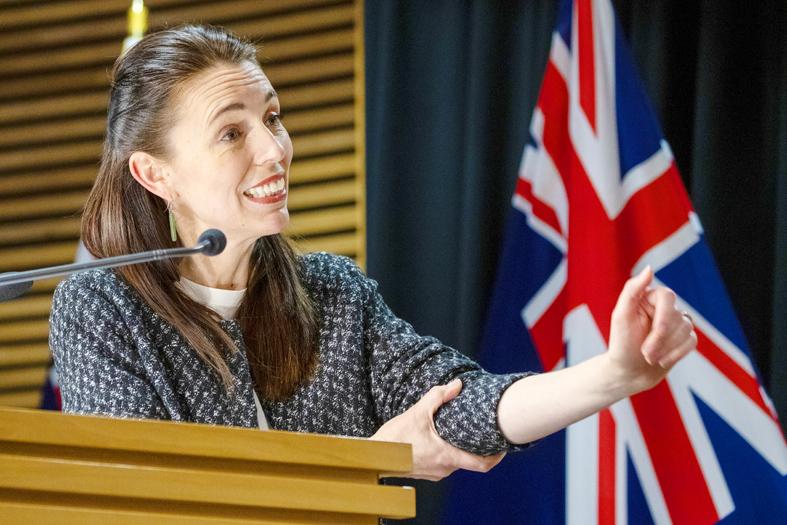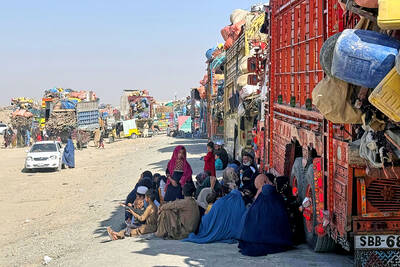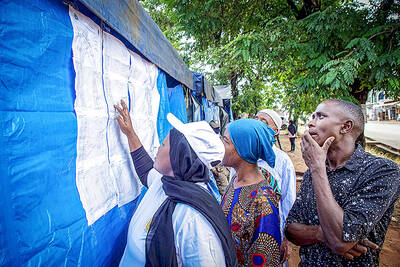New Zealand yesterday abandoned its long-standing strategy of eliminating COVID-19 amid a persistent outbreak of the Delta variant of SARS-CoV-2, and will instead look to live with the virus and control its spread as its vaccination rate rises.
The Pacific nation was among just a handful of nations to bring COVID-19 cases down to zero last year and largely stayed free of the virus until an outbreak of the highly infectious Delta variant in mid-August frustrated efforts to stamp out transmission.
“With this outbreak and Delta the return to zero is incredibly difficult,” New Zealand Prime Minister Jacinda Ardern told a news conference in a major policy shift.

Photo: AP
“This is a change in approach we were always going to make over time. Our Delta outbreak has accelerated this transition. Vaccines will support it,” she said.
Ardern said a lockdown affecting 1.7 million people in the nation’s biggest city, Auckland, would be scaled back in phases, with some freedoms introduced from tomorrow.
The change of direction came as the nation yesterday recorded 29 new COVID-19 cases, taking the total number in the current outbreak to 1,357. Most cases are in Auckland, which has been in lockdown for nearly 50 days.
Amid mounting pressure, Ardern has said her strategy was never to have zero cases, but to aggressively stamp out the virus. She said strict lockdowns would end once 90 percent of the eligible population is vaccinated.
About 2 million New Zealanders have so far been fully vaccinated, or about 48 percent of the eligible population.
Ardern said the Delta variant of SARS-CoV-2 felt like “a tentacle that has been incredibly hard to shake.”
“It’s clear that a long period of heavy restrictions has not got us to zero cases, but it’s OK ... elimination was important because we didn’t have vaccinations. Now we do. So we can begin to change the way we do things,” she said.
People in Auckland would be able to leave their homes to connect with loved ones outdoors from tomorrow, with a limit of 10 people, as well as go to beaches and parks.
Ardern used strict lockdowns and New Zealand’s geographic isolation to eliminate COVID-19 last year, a feat that helped her secure an historic election victory, but a sluggish vaccine rollout and a persistent outbreak this year has dented her popularity.
Auckland residents turned to social media after the announcement, with many cheering the decision, while others expressed concern.
“I think if we’d been at 1-2 unlinked cases a day and/or no infections in community and no spread outside Auckland (and higher vaccination) I’d be cheering right now,” one Auckland resident wrote on Twitter.
University of Auckland professor Shaun Hendy, who has been modeling the spread of COVID-19, said the new freedoms were likely to lead to greater spread and higher case numbers in the coming weeks.
“The government will be hoping that any growth in cases that result is slow enough that vaccination can get ahead of the outbreak, before it puts significant strain on our testing and tracing system, not to mention our hospitals,” Hendy said.
Political parties on both sides criticized the move.
“Jacinda Ardern has no answers to problems that she and her government promised us were under control. The situation is now, very clearly, out of control and worsening every day,” opposition National Party leader Judith Collins said in a statement.
Ardern’s Labour Party coalition partner, the Green Party of Aotearoa New Zealand, said the move would put vulnerable communities and children at risk.

With much pomp and circumstance, Cairo is today to inaugurate the long-awaited Grand Egyptian Museum (GEM), widely presented as the crowning jewel on authorities’ efforts to overhaul the country’s vital tourism industry. With a panoramic view of the Giza pyramids plateau, the museum houses thousands of artifacts spanning more than 5,000 years of Egyptian antiquity at a whopping cost of more than US$1 billion. More than two decades in the making, the ultra-modern museum anticipates 5 million visitors annually, with never-before-seen relics on display. In the run-up to the grand opening, Egyptian media and official statements have hailed the “historic moment,” describing the

‘CHILD PORNOGRAPHY’: The doll on Shein’s Web site measure about 80cm in height, and it was holding a teddy bear in a photo published by a daily newspaper France’s anti-fraud unit on Saturday said it had reported Asian e-commerce giant Shein (希音) for selling what it described as “sex dolls with a childlike appearance.” The French Directorate General for Competition, Consumer Affairs and Fraud Control (DGCCRF) said in a statement that the “description and categorization” of the items on Shein’s Web site “make it difficult to doubt the child pornography nature of the content.” Shortly after the statement, Shein announced that the dolls in question had been withdrawn from its platform and that it had launched an internal inquiry. On its Web site, Le Parisien daily published a

‘NO WORKABLE SOLUTION’: An official said Pakistan engaged in the spirit of peace, but Kabul continued its ‘unabated support to terrorists opposed to Pakistan’ Pakistan yesterday said that negotiations for a lasting truce with Afghanistan had “failed to bring about a workable solution,” warning that it would take steps to protect its people. Pakistan and Afghanistan have been holding negotiations in Istanbul, Turkey, aimed at securing peace after the South Asian neighbors’ deadliest border clashes in years. The violence, which killed more than 70 people and wounded hundreds, erupted following explosions in Kabul on Oct. 9 that the Taliban authorities blamed on Pakistan. “Regrettably, the Afghan side gave no assurances, kept deviating from the core issue and resorted to blame game, deflection and ruses,” Pakistani Minister of

UNCERTAIN TOLLS: Images on social media showed small protests that escalated, with reports of police shooting live rounds as polling stations were targeted Tanzania yesterday was on lockdown with a communications blackout, a day after elections turned into violent chaos with unconfirmed reports of many dead. Tanzanian President Samia Suluhu Hassan had sought to solidify her position and silence criticism within her party in the virtually uncontested polls, with the main challengers either jailed or disqualified. In the run-up, rights groups condemned a “wave of terror” in the east African nation, which has seen a string of high-profile abductions that ramped up in the final days. A heavy security presence on Wednesday failed to deter hundreds protesting in economic hub Dar es Salaam and elsewhere, some